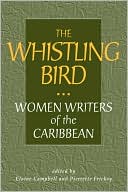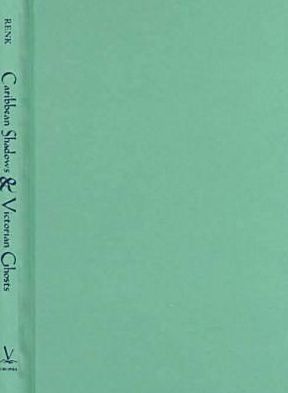Our Caribbean: A Gathering of Lesbian and Gay Writing from the Antilles
The first book of its kind, Our Caribbean is an anthology of lesbian and gay writing from across the Antilles. The author and activist Thomas Glave has gathered outstanding fiction, nonfiction, memoir, and poetry by little-known writers together with selections by internationally celebrated figures such as José Alcántara Almánzar, Reinaldo Arenas, Dionne Brand, Michelle Cliff, Audre Lorde, Achy Obejas, and Assotto Saint. The result is an unprecedented literary conversation on gay, lesbian,...
Search in google:
An anthology of queer writing from the Caribbean.Publishers WeeklyThis sometimes sexy, sometimes dry, but often lush collection of stories by Caribbean gay and lesbian writers is a mixed bag. Certain selections, such as Wesley E.A. Crichlow's "History, (Re)Memory, Testimony, and Biomythography" and Lawrence La Fountain-Stokes's heavily footnoted "Postdata: metatextual wings of a dove" will likely put off all but academics. More accessible are Michelle Cliff's "Ecce Homo," a tale of star-crossed male lovers in Rome during WWII, which has the romantic distance of a sepia photograph, and José Alcántara Almánzar's portrayal of a transvestite in "Lulú or the Metamorphosis." Many of the writings from the 1990s tackle oppression and are tragic in tone. Shani Mootoo's sassy patois story, "Out on Main Street," about how she and her girlfriend negotiate their sexuality in a sweet shop, is refreshingly upbeat, and Audre Lorde's two stories, one about rebuilding in St. Croix after hurricane Hugo, the other a meditation on home and her mother's nostalgia for Grenada-neither of which addresses sexuality-widen the book's somewhat claustrophobic focus. (June)Copyright © Reed Business Information, a division of Reed Elsevier Inc. All rights reserved.
Our Caribbean\ A GATHERING OF LESBIAN AND GAY WRITING FROM THE ANTILLES \ \ DUKE UNIVERSITY PRESS\ Copyright © 2008 Duke University Press\ All right reserved.\ ISBN: 978-0-8223-4208-3 \ \ \ Chapter One\ JOSÉ ALCÁNTARA ALMÁNZAR\ Lulú or the Metamorphosis (1995)\ When night falls everything grows confusing, there are no precise contours or defined faces, nothing but blurry edges, formless masses, shadows gliding from place to place. Lulú is aware of this as she prepares for this big carnival night, on this impatiently-awaited February, long anticipated in minute rites, minuscule savings, restrained impulses, the zealous selling of sweets, and the singsong with which she hawks her merchandise. There's the basket, on the table covered by a flowered tablecloth, still bearing traces of pine nut candy, guava crystals in cellophane half melted from the sun, and other leftovers from her daily work trekking from office building to office building, starting early in the morning, delivering her candied oranges in syrup to the chubby secretary at the Municipal Hall, the ever-yearned-for bread pudding to the Corporation archivist, the plum mini-tarts to the peroxide blonde at Internal Revenue, the nuts-and-honey nougat to the cutie-pie of a chauffeur at Bagrícola, the one who always croons at her with a voice ripe with inspiration: "Lulú, honey, no one makes these sweets better than you." And she glances at him, melting, incredulous, an impish hand on her smiling lips, and sighs, warbles, flutters her curly eyelashes. She leaves swinging a tiny ass imprisoned in tight blue jeans, and saying, no longer looking at him: "Oh, what a lying rascal this Guelo is!," heedless of the bursts of laughter behind her.\ As she went out she felt the hot breeze laden with humidity, dragging along heavy clouds, hoisting dust and papers o the street, tickling her legs, and making her wonder once again if it was worth going to the park and risk ruining under a rain shower what she had put such an effort into creating. She locked her door and started walking with awkward steps. As she walked she displayed the fruits of her labors for all to see, making herself deaf to stupid comments, smiling at those who appreciated the rosiness of her cheeks, the exuberance of her dress, the sparkle of her glittery tinsel jewelry. The streets, swarming with carousers, had become an extension of a grand fiesta, a frolicking revelry spilling drunk and dusky men and women, with their flamboyant masks and costumes and their contagious shrills of happiness, onto the sidewalk. She went on, falsely majestic, betrayed by trips and burps, by the convulsive swishing of her hips, the agitated flailing of her excessively bejeweled arms, the nervous contortions of her head, the troubled and searching eyes.\ Now the ceremony must begin. It doesn't matter how long this transformation into the carnival's most fabulous rumba dancer takes. Her ironed dress, ready, pleased as punch in its court of festoons and rues, hangs on the clothes rack, almost dancing with the sling-back high-heeled shoes, the scintillating bracelets, the necklaces of iridescent bijouterie, the long earrings of deceptive sparkle, and everything that adorned the famous dancers that Lulú never grows tired of going to see at the Julia Cinema, the very same ones that she used as models in making her dress, the flame-colored turban that will cover her head, the plastic roses she has sewn to her shoes, the tones of that exuberant makeup she has reserved for today.\ The park was packed with people, with hawkers of every sort of tidbit to satisfy the carnival revelers' every possible whim as they swaggered in the park's inner paths, watching the performance of the municipal band. From the gazebo wafted the strains of a danzón that invaded the reveries of the old, making them yearn for an era decidedly dead. She made her entrance with an undisguisable awkwardness which seemed to increase as the effects of the three beers she had drunk intensified. She walked down the center of the main path, shaking the festoons of her slithering multicolor train. From the benches flanking the path, now occupied by strange characters, she began to hear insidious taunts and catcalls that prompted her to raise her head too high, exposing her to tripping on the mosaics dislodged by the tree roots.\ Lulú is lying on the bed like a wet and porous leaf. She is soothing herself before initiating the beautification ritual. Although seemingly at peace, her body quivers on the bed, her skin vibrates as it makes contact with the clean white cotton of the bedclothes. She picks up the hand-held mirror and looks at herself. Her face betrays the apprehension that perturbs her. She drops the mirror, turns on the radio, and instantly the honey-and-molasses voice of an announcer explodes into the room, counseling brief rests between household chores, touting the importance of relaxation for remaining young and beautiful, my dear homemaker, the benefits of that cleansing cream you bought to keep your face smooth like that of a porcelain doll, even though it may not lighten your dark skin. That's why she won't be dressing up as a sassy Spaniard or a little Dutch girl. Who has ever heard-Lulú says it herself-of black Europeans, thick-lipped, with straightened hair and meatball noses? What Dutch and Spanish women lack is her slender wasp waist, the long strong legs she exercises every day, walking from office to office, up and down stairs and hallways, asking leave to drop o orders, bending to put her basket down somewhere to sell a macaroon to a busy passerby, placing it again on the babonuco of rolled-up rags crowning her head before going on her way with an old Lola Flores song on her lips.\ Despite the laughter from the crowd, she advanced to the gazebo, trying with discombobulated steps to climb up to the platform for a chat with the band leader. The catcalls increased with each stride on the worn-out steps. The initial uproar gave way to cruel and provoking taunts. A young boy almost made her fall down by stepping on her train. She turned around and, goaded by anger, spat a phrase at him that was drowned out by the cymbals and drumbeats of the song's final crescendo. She raised a menacing fist against the mob, grabbed her train, wrapped it around her arm and continued her climb to the gazebo.\ She picks up the razor, lathers up her arms and legs and starts to shave o the growth of the last few days. There can't be a trace of hair left on the skin. The razor glides down the arm to the beat of a piercing salsa coming from the radio. The hairs slide down the drain and the arm glistens, silky, still streaked with mentholated foam. The legs are a more difficult terrain. They resist the blade's depilatory action, proffering obstacles that bog the razor down, causing tiny sharp cuts that sting like scratches from a cat's claws. She replaces the blade on the razor and the new edge removes the stubborn hairs, vanquishing their stiff resistance. Now they are two sleek and pliant legs, speckled with white foam, legs that can slide easily into the net of a pair of nylon stockings.\ The band leader glanced at her from head to toe and couldn't repress a smile in which mingled derision and compassion. He nodded his agreement, promising her that after the pasodoble his boys would play the rumba she was requesting. She thanked him by extending a limp hand and making a long and ceremonious bow. Then the band leader turned to his musicians, raised his hands, and launched into the next selection of the concert program. She climbed down the steps to the martial strains of an operatic march.\ She goes to the refrigerator, takes out a beer, opens it, introduces the opening of the bottle into her mouth, sips the golden liquid, drinks it in until the cold stuns her and makes it impossible for her to continue swallowing. The melody of a romantic bolero pierces through her body, making her forget momentarily the razor and what remained of the procedure. Lulú closes her eyes and thinks of Ciro. He will be at the park selling peanuts when she appears in her rumba dancer costume, joining the phony ladies and the gentlemen decked out in suits rented for the occasion. She will provide the sorely needed spice. She will go to the gazebo and ask the director of the band to play something hot and then she will dance-and she will steal the show. If Ciro approaches her she will offer to buy him a drink, and she knows he will accept, as she knows he will go home with her because he needs both the money and the affection, and who but she could give them to him, as she always has.\ During the pasodoble she saw her man in the throng. He was carrying on his daily work, oblivious to the bustle of the crowd and the roar of the cars climbing the hill on the broad avenue, stopping at the park entrance or blowing their horns at the distracted pedestrians. The alcohol rushed to her head, she felt her legs giving way and shuddered at the thought of an encounter with him. She hesitated for an instant. It would be better if he tried to make his way towards her first. She took a powder case from between her breasts and looked in the tiny mirror at her own face covered with wee beads of sweat that were beginning to make her makeup run. She dusted fresh powder on her face with the small puff.\ The indecisive razor moves down her underarm, detaching a clump of hard bristles. More lather, more water, another blade, the third. The hairs give way, the body is becoming as hairless as that of a fifteen-year-old girl, only the belly remains before everything looks like the surface of polished mahogany, without scratchy or rough patches that could lead to rejection, that could discourage caresses from robust hands or betray the scandalous contradictions of her body.\ The rumba burst as she was putting the powder case away. She immediately ran to the gazebo and started to dance, surrounded by the crowd that had gathered to watch the spectacle. Her body was moving without restraint; the feet drew sparks from the mosaics; the legs, lengthened by the high heels, dashed to and fro furiously, as if deranged; the hips contorted; the bracelet-laden arms whirled, tracing circles in the air; the head gaily followed the rhythm of the music. In the midst of the frenzied uproar, she danced with eyes closed, seemingly enthralled in a brutal trance. She advanced and retreated, shook the bare shoulders, got down on her knees and up again, now completely barefoot. Her two massive feet, finally liberated from the high heels, took hold of the pavement, zigzagging, filling her with pleasure.\ The eyebrows are more used to the punishment of the tweezers. The coarse hairs wrench themselves from their root systems following the jittery progress of the small metallic jaws. Each plucked hair wrings a tear out of Lulú. Her watery eyes watch how the recently bared flesh swells, and the line of black dots that used to be her eyebrows disappears, leaving a clear smooth surface for a perfect stroke of an eyebrow pencil.\ She continued to move, totally possessed by the madness of the dance. Then the pirates burst in, vociferating, pushing their way through the crowd. The group was captained by a Francis Drake too dwarfish and pot-bellied to be convincing. They hurled fierce curses at the crowd, threatening it with wooden swords, tin knives, cudgels, and toothless mouths with sewer breath. The dancer, furious at their stealing her audience's attention, pounced on the intruders with a savage cry. The rumba was coming to an end, precipitated by the band leader, who sensed the chaos of the approaching brawl.\ Lulú spreads the lotion over her body, and the dusky, chocolate-colored skin glistens, thirstily absorbing the oil from the cleansing substance. Her flexible body quivers under the warmth of the massage, the epidermis throbs as it is stroked by the caresses from her own hand, now descending to her groin and stopping, hesitatingly, anxiously, at the edge of an immense appendage which the hand squeezes and abandons in sudden bursts, intermittently, going as if from fury to repentance. Lulú lies on the bed, gulps down the rest of the beer, closes her eyes, and buries her head in the pillow. Her temples pulsate, she gropes for air, the rebellious hand continues its task, Ciro's face emerges from the bottom of a river, his body covered with drops of water, but he's not dead, just playing with the liquid, and he waves goodbye with a victorious hand. He dives in again for an instant, the hand goes up and down, slides on the slippery phallus. Ciro returns to the surface and this time signals to Lulú to dive in after him, he wants her to accompany him. Lulú dips her foot in the warm water, then drops her body in, and the river swallows her. It seems to her as if she were going to die, but Ciro rescues her, he lifts her up in the air as if he could not hold her for long or find a foothold under water. Then he takes her to a safe place. Up and down, charging forcefully, the member bulges to its utmost, nearing the climax. Lulú feels Ciro's warm body next to her, looks at his face in the sunlight, their breaths mingle, she holds on to the man's equine neck and then she feels his hand on the penis which her hand now grabs convulsively, and Lulú explodes in obscene cries which the pillow silences so that only she can witness the volcano's eruption.\ From every corner of the park emerged frenzied characters joining the fray. In jumped little devils with rubber pitchforks, followed by Death chasing an almost naked Lothario, a carioca band which materialized from another corner, several gladiators carrying shields and spears, Don Quixote mounted on a donkey, and a multitude of magicians, soldiers, and peasants. The witches appeared at the most unexpected moment, brandishing brooms that they wielded as clubs. The dancer clung to Drake's tangled locks, digging her teeth into the corsair's flabby neck. They had fallen to the ground, circled by a crowd egging them on. From time to time others also fell, spurred by the example of the dancer and the corsair. Not very far from them, a goblin strangled two ape-men, and a harlequin, decked in jingling bells, ribbons, and bit and pieces of mirror, attempted to finish off a manly nun growling in a thicket.\ She is immediately overtaken by an inescapable slackness, her tendons go limp, the muscles yield to a compulsory lethargy which yearns to be infinite. Suddenly the flesh slackens, the extremities slump, the skin oozes the effluvium of fulfilled desire, the fires that fed her fantasy die out. The image of Ciro in the river also fades, replaced by an immediate and more humdrum reality. Lulú's head emerges from the depths of the pillow: there's the table with its flowered tablecloth, the basket encircled by a line of gluttonous ants, the refrigerator with its voiceless hum, the alarm clock, the sink still leaking, the battery-operated radio still turned on, the landscapes cut out of old calendars, and an armoire with its doors open where the regal carnival dress still hangs, imperturbable. Lulú drops her head back on the pillow while she wipes away the jelly-like remains of the eruption and bit by bit reinitiates the inventory of what has already been done and calculates what's still left to do. She jumps to her feet and opens a drawer in the lower half of the armoire. She rummages through the contents and takes out a pair of panties into which she introduces her long legs. The sex is reduced to a mound that she compresses further with a pair of pantyhose. Her vital problem resolved, her androgynous figure moves from one end of the room to another. She takes out her makeup implements and finally settles down on a stool before the armoire's mirror.\ Her dress torn, her turban gone, her eyelashes unglued, the dancer still hangs onto the corsair. The band has dispersed. The musicians fled the gazebo, their instruments above their heads, protecting them from irreparable harm. The band leader had tried to calm tempers down and break up the fight, but two mischievous harlequins prevented him, holding him by the arms and leading him on a dance through the park.\ (Continues...)\ \ \ \ \ Excerpted from Our Caribbean Copyright © 2008 by Duke University Press. Excerpted by permission.\ All rights reserved. No part of this excerpt may be reproduced or reprinted without permission in writing from the publisher.\ Excerpts are provided by Dial-A-Book Inc. solely for the personal use of visitors to this web site. \ \
Acknowledgments ixIntroduction: Desire through the Archipelago Thomas Glave 1Lulu or the Metamorphosis (1995) Jose Alcantara Almanzar 13Property Values (2001) Aldo Alvarez 21Eroticism (1992) Reinaldo Arenas 34Three Poems: Saturday Night in San Juan with the Right Sailors (2004) Almost a Revolution for Two in Bed (2004) Tropical Fever (2003) Rane Arroyo 51Three Poems: Transactions (2001) San Francisco-New Orleans (2001) The Image Saves (1994) Jesus J. Barquet 53Somebody Has to Cry (1998) Marilyn Bobes 57Elizete, Beckoned (1996) Dionne Brand 70"Bullers" and "Battymen": Contesting Homophobia in Black Popular Culture and Contemporary Caribbean Literature (1997) Timothy S. Chin 78Ecce Homo (2002) Michelle Cliff 97History, (Re) Memory, Testimony, and Biomythography: Charting a Buller Man's Trinidadian Past (2004) Wesley E. A. Crichlow 101Other Islanders on Lesbos: A Retrospective Look at the History of Lesbians in Cuba (2004) Mabel Cuesta 132Autonomy in Lesbian-Feminist Politics (2004) Ochy Curiel 142Three Poems: YoungFaggot (2003) The Magical Real (2003) Surrender (2003) Faizal Deen 153The Portrait (1998) Pedro De Jesus 158Tante Merle (1999) R. Erica Doyle 173Whose Caribbean? An Allegory, in Part (2005) Thomas Glave 177More Notes on the Invisibility of Caribbean Lesbians (2005) Rosamond S. King 191Independence Day Letter (2004) Helen Klonaris 197Travel Notes of a Queer Puerto Rican in Havana (2002) Lawrence La Fountain-Stokes 202Of Generators and Survival: Hugo Letter (1990) From Zami: A New Spelling of My Name (1982) Audre Lorde 233Out on Main Street (1993) Shani Mootoo 252Time and Tide (2002) Anton Nimblett 261We Came All the Way from Cuba So You Could Dress Like This? (1994) Achy Obejas 268The Hunter (1999) Leonardo Padura Fuentes 281The Face (1956) Virgilio Pinera 290Dale and Ian (1994) Patricia Powell 296Genesis (2003) Kevin Everod Quashie 304Bayamon, Brooklyn y yo (1987) Juanita Ramos 308The Mechanic (1998) Colin Robinson 316Haiti: A Memory Journey (1996) Assotto Saint 320Johnnie, London, 1960 (1960) Andrew Salkey 325I Want to Follow My Friend (1994) Lawrence Scott 336Man Royals and Sodomites: Some Thoughts on the Invisibility of Afro-Caribbean Lesbians (1992) Makeda Silvera 344Jerome (1993) H. Nigel Thomas 355Fragments of Toronto's Black Queer Community: From a Life Still Being Lived (2005) Rinaldo Walcott 360Mati-ism and Black Lesbianism: Two Idealtypical Expressions of Female Homosexuality in Black Communities of the Diaspora (1996) Gloria Wekker 368On Homophobia and Gay Rights Activism in Jamaica (2000) Lawson Williams 382Glossary 389Contributors 393
\ From the Publisher“With excerpts from the work of luminaries like Audre Lorde, Reinaldo Arenas, Michelle Cliff, Assotto Saint, Achy Obejas, and Aldo Alvarez, there's no question this anthology has serious literary heft, beyond its import as a first-of-a-kind collection. But it's the lesser-known (and, in some cases, never-before translated) contributors who add value. . . . everal contributions are emphatically academic, footnotes and all, but these provide ballast for Glave's authentic, eclectic collection.” - Richard Labonte\ “Glave has given us a valuable record of the real beauty and brutality that lurks behind the travel posters.” - Harry E. Baldwin, Frontiers\ “Our Caribbean will likely become a classic compilation and a must-read for anyone who wants to learn more about what it means to be from the Antilles region of the world and to find a home in the LGBT community.” - Rachel Pepper, Curve\ “You need to take time with this collection. It is a delicious gathering of voices, all different, but with interweaving themes. You cannot rush this experience. From the luscious, sexy racy prose to the cutting edge politics, every line has shape and depth and plays upon you long after the reading. This book will rock you, rock within you, like This Bridge Called My Back, edited by Cherie Moraga, did in the 1970’s”. - Cathie Koa Dunsford, Asia and Pacific Writers Network\ “[An] important and amazing collection. . . . All of the essays, fiction, and poems in this collection impress, and with this text, Glave has created a very important addition to the growing shelf of international GLBT literature.” - Michael G. Cornelius, Bloomsbury Review\ “You don’t have to be gay, lesbian, or Caribbean . . . to appreciate this anthology, though it is certainly a seminal contribution to the fields of Caribbean literature and gay and lesbian studies. Most of its contents are worth reading for the drama, sensitivity, and complexity required of such identities.” - Emily Raboteau, American Book Review\ “Our Caribbean is a superb anthology. Thomas Glave does not exaggerate when he writes that this is ‘a book that I and others have been waiting for and have wanted for all our lives.’ Here we have a book that makes literal the ongoing necessity to write ‘against silence.’”—Elizabeth Alexander, author of American Blue: Selected Poems\ “Traversing boundaries of geography, history, language, and desire, Thomas Glave has assembled a poignant testament of how we dare to love differently and yearn for justice in the same breath...Necessary and timely.”—M. Jacqui Alexander, author of Pedagogies of Crossing: Meditations on Feminism, Sexual Politics, Memory, and the Sacred\ \ \ \ \ \ Publishers WeeklyThis sometimes sexy, sometimes dry, but often lush collection of stories by Caribbean gay and lesbian writers is a mixed bag. Certain selections, such as Wesley E.A. Crichlow's "History, (Re)Memory, Testimony, and Biomythography" and Lawrence La Fountain-Stokes's heavily footnoted "Postdata: metatextual wings of a dove" will likely put off all but academics. More accessible are Michelle Cliff's "Ecce Homo," a tale of star-crossed male lovers in Rome during WWII, which has the romantic distance of a sepia photograph, and José Alcántara Almánzar's portrayal of a transvestite in "Lulú or the Metamorphosis." Many of the writings from the 1990s tackle oppression and are tragic in tone. Shani Mootoo's sassy patois story, "Out on Main Street," about how she and her girlfriend negotiate their sexuality in a sweet shop, is refreshingly upbeat, and Audre Lorde's two stories, one about rebuilding in St. Croix after hurricane Hugo, the other a meditation on home and her mother's nostalgia for Grenada-neither of which addresses sexuality-widen the book's somewhat claustrophobic focus. (June)\ Copyright © Reed Business Information, a division of Reed Elsevier Inc. All rights reserved.\ \






